BBG Watch EXCLUSIVE Commentary
This article covers legal issues. Please read our Disclaimers and Terms of Use.
BBG Watch has tracked down a copy of the $400 million Class Action Complaint which was filed on December 21, 2015 in the United States Court of Federal Claims against the U.S. Government over personnel and contracting practices overseen by top officials of the Broadcasting Board of Governors (BBG). The plaintiffs, BBG and Voice of America (VOA) workers Seh Ahn Lee, Irina Ryan, and Ahmad Nariman, allege on behalf of themselves and all other persons who are similarly situated (“Class Members”) that the U.S. government-funded, international news broadcaster’s Board of Governors denied proper pay and benefits to VOA employees intentionally misclassified as independent contractors by agency officials.
The complaint states that the plaintiffs are assisted by the Washington law firm THEMIS PLLC.
BBG Watch is reposting parts of the Class Action Complaint and provides a LINK to the entire document which is now public.
1. Plaintiffs, Seh Ann Lee, Irina Ryan, and Ahmad Nariman, bring this action against the United States of America on behalf of themselves (“Plaintiffs”) and all other persons who are similarly situated (“Class Members”).
2. For many years, the Board of Broadcasting Governors (“BBG”) obtained the services of Plaintiffs and Class Members, who were referred to within the agency as “purchase order vendors.” The BBG put the Plaintiffs and Class Members on purchase orders so it could extract their faithful service to the United States while avoiding payment of the more substantial compensation that is owed to federal employees.
3. In fact and law, and as found by the Inspector General of the Department of State (“OIG”), Plaintiffs and Class Members were working all along in the capacity of federal employees, and not in the capacity of independent contractors, primarily because they were providing “personal services.” Plaintiffs and Class Members were thus entitled to the compensation of federal employees, in amounts that were far in excess of what they actually received under their purchase orders.
4. As found by the OIG, the BBG issued the purchase orders in knowing violation of law, for the admitted purpose of denying Plaintiffs and Class Members the compensation that was due to them.
5. In response to the OIG, the BBG did not deny that it was lawfully required to compensate and contract with Plaintiffs and Class Members as federal employees. To the contrary, the BBG’s officials admitted that they knowingly continued to issue and renew unlawful purchase orders, because to contract with Plaintiffs and Class Members as employees, as the law required, “would likely increase [the BBG’s] costs [by] more than 30 percent.”
6. The BBG admitted, based on its own calculations, that it was depriving each Plaintiff and Class Member of benefits and employer-side payments of payroll taxes in the amount of $20,000 to $30,000 per year. The BBG’s estimate of the total injury to all Plaintiffs and Class Members is $12 to $18 million per year, or approximately $200 million over all the years in which the BBG was employing Plaintiffs and Class Members by purchase order.
7. In addition to depriving Plaintiffs and Class Members of these benefits and tax payments, the BBG unlawfully failed to pay the mandated rates of wages or salaries for contract employees of the United States, causing millions of dollars in additional damages. As personal service providers, Plaintiffs and Class Members were entitled to wage rates commensurate with federal guidelines. Pending discovery, Plaintiffs estimate that they and the Class Members suffered as much as $200 million in lost pay.
8. Plaintiffs demand back pay for the value of the wrongfully withheld wages and salaries, benefits, and tax payments for themselves and the Class Members pursuant to 5 U.S.C. § 5596 and under their express or implied contracts of federal employment.
The Class Action Complaint provides additional information about each plaintiff:
14. Plaintiff Seh Ahn Lee is a native of South Korea. He contracted for over 12 years with various services of the VoA, including the Korean service and the Director of the East Asia and Pacific Division for the office of the Research and Information Center (“RIC”). RIC covers ten language services: Burmese, Cambodian (Khmer), Mandarin, Cantonese, Korean, Indonesian, Thai, Tibetan, Laos (Lao), and Vietnamese. He is an adult resident of Germantown, Maryland, and a naturalized citizen of the United States. He received a Ph.D. in sociology from the University of Chicago. He has over 30 years of experience in research in the social sciences, including more than twelve years in the field of news and media research. He provided personal services to the BBG from 2003 to 2015 under a series of purchase orders. He satisfies the test that the OIG applied, and that the BBG accepted as appropriate, to determine which of the BBG’s so-called purchase order vendors were functioning as federal employees. He continues to provide personal services directly to the BBG under a sub-contract that was issued to him on or about June 1, 2015, by Technologist, Inc., which is a staffing agency that nominally serves as a prime contractor to the BBG.
15. Plaintiff Irina Ryan is a native of Russia. She contracted for a total of nine years, over multiple tenures, with several services within the VoA, including the Russian Service, the Media Asset Management Service, and the Technology, Services and Innovation Department. She is an adult resident of Virginia and a naturalized citizen of the United States. She has a Bachelor’s degree in Russian Language and Literature from Herzen State Pedagogical University of Russia and 15 years’ experience in journalism and multimedia. She provided personal services to the BBG at various times from 2000 to 2015 under a series of purchase orders. She satisfies the test that the OIG applied, and that the BBG accepted as appropriate, to determine which of the BBG’s so-called purchase order vendors were functioning as federal employees. She continues to provide personal services directly to the BBG under a sub-contract that was issued to her by CTS-Computer Technology Services, Inc., which is a staffing agency that nominally serves as a prime contractor to the BBG.
16. Plaintiff Ahmad (Afshin) Nariman is a native of Iran. He contracted with the Persian Service of the VoA for six years. He is an adult resident of Virginia and a naturalized citizen of the United States. He has a Bachelor’s degree in Microbiology from Azad University of Tehran and eight years’ experience in editing and producing television news programming. He provided personal services to the BBG from June, 2007 to May, 2013 under a series of purchase orders. He satisfies the test that the OIG applied, and that the BBG accepted as appropriate, to determine which of the BBG’s so-called purchase order vendors were functioning as federal employees. His service to the VoA, and to the security interests of the United States, has put his personal safety at risk, and made it difficult or impossible for him to return to his native country, because he was in front of the camera for the “OnTen” program, which took a critical view of the Iranian government’s policies and the political, social and economic conditions in Iran. Any person engaged in such activity is unable to return to Iran for fear of imprisonment and worse. In addition, he went to Iraq twice, and to Syria once, on behalf of the Persian service, to prepare reports for VoA programs. He and his team, consisting entirely of contractors like himself, were placed in grave danger and received little security from the Persian service.
The Class Action Complaint describes the Office of Inspector General’s (OIG) audit of the purchase orders. “As found by the OIG, virtually all of the purchase orders were for personal services, were issued in excess of the statutory limit on personal services contracts, and were thus in violation of the POV Handbook, the FAR, and other provisions of law,” the Class Action Complaint states. “The OIG specifically found, and the BBG ultimately admitted, that the BBG knowingly violated its statutory obligation to treat the vast majority of its purchase order vendors, including Plaintiffs and Class Members, as federal employees,” the complaint says.
THE OIG’S AUDIT OF THE PURCHASE ORDERS
17. This case is based largely upon facts found by the OIG in its recent audit of the BBG’s purchase orders with the Plaintiffs and Class Members, and upon statements and admissions that the BBG and its officials made in response to the audit.
18. The purpose of the audit was to determine whether the BBG was in compliance with federal regulations for acquisitions.
19. The OIG conducted fieldwork from June 2013 to December 2013 at the BBG’s Office of Contracts.
20. The Office of Contracts, within the Broadcasting Bureau, is responsible for the planning, management, and implementation of all acquisition efforts of the BBG, including the acquisitions of services from Plaintiffs and Class Members.
21. The BBG’s acquisitions of goods and services are subject to the Federal Acquisition Regulations (“FAR”), which establish uniform policies and procedures for acquisitions by all executive agencies.
22. The BBG contracts directly with many hundreds of professionals and talented individuals, including writers, stringers, announcers, and translators. As the BBG explained to the OIG, “The agency requires assistance from individuals with a wide variety of technical and journalistic talent – many of whom are native speakers of the languages in which we broadcast and knowledgeable about the markets we serve… . Thus, the BBG and its predecessor, the U.S. Information Agency, have greatly benefitted from the broad range and diverse mix of contractors supporting these programs.”
23. In 2010, the BBG issued an updated version of what is commonly referred to as the “POV Handbook,” which purports to be an authoritative statement of procedures for legally acquiring non-personal services from independent contractors, whom the BBG refers to as “purchase order vendors.”
24. Under the POV Handbook and the federal law that it purports to implement, there is a crucial distinction between non-personal and personal services. The BBG may acquire non- personal services from independent contractors essentially without limit. But under FAR 37.104(b), the BBG may acquire personal services only by establishing an employment relationship, either by appointment or by contract, except to the extent of a specific Congressional authorization to use independent contractors instead of employees.
25. Congress authorized the BBG to acquire personal services from no more than 60 independent contractors. Beyond that allotment, the BBG was required to acquire personal services through employment relationships, whether by appointment or employment contract.
26. The essential (and essentially admitted) fact of this case is that the BBG injured the Plaintiffs and Class Members by acquiring their personal services under independent contracts in numbers that exceeded the BBG’s Congressional authorization by a factor often. The BBG did so for the admitted purpose of depriving Plaintiffs and Class Members of the higher pay, benefits, and tax contributions to which they were entitled as employees.
27. At any given time within the period of limitations, the BBG was obtaining services from approximately 660 so-called “purchase order vendors,” including Plaintiffs and Class Members.
28. As found by the OIG, virtually all of the purchase orders were for personal services, were issued in excess of the statutory limit on personal services contracts, and were thus in violation of the POV Handbook, the FAR, and other provisions of law.
29. The OIG specifically found, and the BBG ultimately admitted, that the BBG knowingly violated its statutory obligation to treat the vast majority of its purchase order vendors, including Plaintiffs and Class Members, as federal employees.
THE FINDINGS AND ADMISSIONS OF ILLEGAL CONTRACTING FOR PERSONAL SERVICES
43. The OIG’s audit of the purchase orders fundamentally inquired whether they were for personal or non-personal services, as that distinction determines whether the services must be acquired through employment relationships. To draw the distinction, the OIG applied the six criteria of FAR 37.104(d); compared those purchase orders labeled “personal services contract” with those labeled “non[-]personal services contract”; and interviewed contracting officers and other program officials.
44. The OIG found “ultimately that an employee/employer relationship existed” with respect to nearly all of the audited purchase orders, due to the personal nature of the services provided:
a. “For example, the vast majority of the contracts we selected called for the contractor to report to work, on site, during specified hours and perform work as directed by a BBG employee.”
b. “[T]he contractors [on purchase orders labeled for ‘non-personal services’] were performing almost identical job requirements as those labeled for personal services. . . .”
c. “Further, when comparing services contracts labeled as personal or non[- ]personal services, we found that, although the contract language differed, the manner in which the contracts were administered was identical.”
45. OIG determined that 14 of 16 sampled purchase orders were improperly labeled for non-personal services, when in fact the work was in the nature of personal services. OIG could not determine whether the remaining two sampled purchase orders were appropriately labeled; and in the end, OIG could not affirm that even one sampled purchase order was lawful.
46. The OIG reported that, “[i]n addition to our analysis, a [Broadcasting Bureau] official stated that the BBG had approximately 660 services contracts that may have been personal in nature[, as compared to a statutory limit of 60]. Based on BBG’s improper labeling of 14 (88 percent) of the 16 contracts in our sample, statements made by various BBG officials, and work performed by another Federal agency, OIG concluded that the overwhelming majority of BBG’s [660] services contracts were likely personal in nature. OIG determined that BBG had routinely exceeded its statutory authority to enter into [personal services contracts]” with the so- called purchase order vendors to avoid contracting with them as employees, (emphasis added)
47. Under the six criteria of the FAR, the OIG found that:
a. in the overwhelming majority of sampled contracts, contractors performed work on site at either the VoA Headquarters in Washington, DC, the Office of Cuba Broadcasting in Miami, FL, or a regional BBG office;
b. equipment and programming were provided by BBG;
c. “all” of the work was in furtherance of the international broadcasting mission;
d. similar tasks were performed by civil service employees hired by BBG;
e. the average length of contractor service was 5 years, ranging from 1 to 13 years; and
f. in the generally dispositive test of the employer/employee relationship, government employees directly supervised the work performed by contractors.
The OIG also found that:
a. positions filled by purchase order vendors, such as Plaintiffs and Class Members, should have beenfilled byfull-time employees;
b. none of the contracting officers interviewed during the audit “could elaborate on a difference in treatment between personal and non[-]personal services contractors, or full-time employees”;
c. BBG contracting officials did not know the difference between personal and non-personal services contracts, which indicated to OIG that there was a lack of awareness of the statutes under which these officials were supposed to be operating;
d. the Government exercised relatively continuous supervision and control over the supposed purchase order vendors;
e. the BBG allowed contractors to perform inherently governmental functions;
f. contracting officers were sometimes pressured by senior officials to award contracts that they knew were not in accordance with the FAR;
g. personal services contracts were routinely awarded above the statutory limit;
h. contractor services were regularly accepted before the contracting officer signed the contract or any contract was lawfully awarded;
i. contractor services were accepted before funds were secured, and in a few instances, when funding was simply not available;
j. the BBG allowed contractors to work without having any contract at all;
k. agency officials admitted that “contractors may not have been aware that they were working without a valid contract”;
l. there was little evidence that acquisition planning occurred;
m. there was limited to no evidence that contract oversight was performed;
n. selected contracting officials had limited training and some officials signed documents that were not in accordance with federal procurement regulations; and
o. as a result of noncompliance with the FAR and other procurement statutes, the BBG had a reportable violation of the Anti-Deficiency Act.
49. The OIG determined that the BBG did not follow the FAR during the pre- solicitation, pre-award, or contract administration phases of acquiring services from purchase order vendors including Plaintiffs and Class Members. In particular, the BBG did not provide adequate oversight of the acquisition process. The OIG also found that contracting officers did not meet statutory training requirements.
50. The OIG specifically cited the “willingness” of the BBG’s “leadership” to “disobey the law.” It also cited systemic shortcomings in the BBG’s contracting practices, including but not limited to the absence of leadership in promoting an effective procurement process, a lack of accountability for noncompliance, and an environment in which some contracting officials were not able or willing to award contracts in accordance with regulations. Together, the bad leadership and the bad practices led to the prolonged illegality in acquiring personal services by purchase order in knowing violation of a statutory limit.
51. The BBG admitted the OIG’s essential findings of illegally treating providers of personal services, including Plaintiffs and Class Members, as independent contractors. As recorded by the OIG, an agency official estimated that only 44 of approximately 660 services contracts appropriately distinguished between personal and non-personal services.
52. The BBG admitted that it consciously chose to use the purchase orders in violation of law, over a period of many years, to avoid the cost of providing Plaintiffs and Class Members with the compensation to which they were entitled as federal employees.
53. OIG asked officials why this practice continued to occur, and found that it had been a long-standing practice which had never changed, even when it was identified as a problem. BBG officials stated that they examined alternatives to breaking the law, but each lawful alternative would likely increase costs more than 30 percent, and therefore, the BBG rejected each potentially lawful option.
54. OIG also asked officials to explain the difference between those personal services contracts that were lawfully issued within the statutory limit, and the purchase orders at issue, which were supposedly issued for non-personal services. The answer from BBG officials was universal: there was no difference in the nature of the work performed.
55. During interviews with various program officials, OIG asked why contractors were hired to fill positions that should have been filled by full-time employees. According to agency officials, the BBG used illegal purchase orders because the agency did not have the authorization to fill full-time employee positions, and because contracting officials may not have been fully aware of or properly trained on the definition and proper implementation of statutory limitations.
56. Writing in response to the OIG’s findings, “[t]he BBG agree[d] that we must take immediate steps to ensure that our contracts properly define the work required, and that non- personal service contracts be implemented in accordance with associated statements of work in all cases.”
57. The BBG ultimately agreed to transition away from illegally contracting for personal services. Crucially, it did so in response to the findings and admissions on which Plaintiffs and Class Members here rely. “The Agency concurs [with the OIG] that it cannot employ personal service contractors in excess of those authorized.. . [and has decided upon] a large scale move away from the contracting vehicle which currently is most frequently utilized .. . .[T]o mitigate the risks identified by the OIG, the Agency has sought authority from the Congress to employ up to ‘700 United States citizens or aliens’ as personal service contractors.”
58. In addition to the OIG and the BBG, other fact-finders have determined that persons working in the same capacities as the Plaintiffs and Class Members were serving as federal employees.
59. The Internal Revenue Service (IRS) determined in 2010 that certain BBG contractors providing “talent and other professional services” were not independent contractors and should have been classified as employees for tax purposes, primarily due to the control that the BBG exercised over them. Per a memorandum dated November 22, 2013, the IRS found that the BBG “exercised or had the right to exercise such control over the workers in the performance of their services as was necessary under the usual common-law rules to establish the relationship of employer and employee.”
60. In a case alleging employment discrimination, where an employer-employee relationship was an element of the claim, the United States District Court for the District of Columbia found, just as the OIG found in its audit, that the most important factor in determining an employment relationship is the employer’s right to control the worker’s performance. The court further found that the plaintiff, with whom the VoA contracted as a purchase order vendor, was in fact performing the work of a federal employee and was thus entitled to the corresponding rights of an employee under the statutes at issue in that case.
PRAYER FOR RELIEF
WHEREFORE, Plaintiffs respectfully request this Court to certify the class as
identified herein, enter judgment against Defendants, and award the following relief:
a) back pay for damages including, but not limited to, benefits, tax contributions, and wages in the approximate amount of $400 million;
b) interest, costs, and attorney’s fees; and
c) such other relief as the Court deems just and proper.
Dated: December 21,2015
Respectfully Submitted, THEMIS PLLC
John P. Pierce
David L. Engelhardt
Michael Cone
2305 Calvert St. NW Washington, DC 20008 Telephone: (202)567-2050 Facsimile: (202)567-2051
Counsel for Plaintiffs
READ FULL CLASS ACTION COMPLAINT
AFGE Local 1812, the union representing Broadcasting Board of Governors (BBG) employees, had warned repeatedly in the past about alleged abuses by a small group of longtime BBG’s International Broadcasting Bureau (IBB) executives which appear to be the primary cause behind the new class action lawsuit.
The following AFGE Local 1812 commentary was posted in July 2014 and reposted by BBG Watch:
Are VOA Contractors Really Employees? – Commentary by AFGE Local 1812
While the BBG has been hit with many employment related lawsuits in recent years, the new $400 million class action lawsuit comes close in the amount of money which was sought and won by plaintiffs in the Hartman gender discrimination case filed by women who were denied employment by VOA and BBG’s predecessor agency, USIA. After many years of litigation, the agency eventually agreed to settle the Hartman case in 2000 at a cost to U.S. taxpayers of over half a billion dollars ($508 million).
In announcing the settlement of the Hartman case, the Broadcasting Board of Governors stated in 2000 that “it underscores the continuing need for effective mechanisms and procedures to ensure that discrimination does not occur, that equal opportunity does exist, and that a case such as Hartman can never happen again.”
Last year, the BBG lost another employment lawsuit over the 2009 illegal RIF (reduction-in-force) of Office of Cuba Broadcasting (OCB – Radio and TV Marti) employees. Some agency officials reportedly wanted to challenge the court’s ruling but were overruled by BBG chairman Jeff Shell. Those OCB employees were given back their jobs and lost earnings, but current and former employees and contractors at the Voice of America and at some of BBG’s non-federal entities, particularly Radio Free Europe / Radio Liberty (RFE/RL), continue to complain. Rather than diminishing, allegations of discrimination and arbitrary treatment of various classes of employees increased and employee morale fell as the agency was being run in recent years by a new group of career bureaucrats on behalf of the part-time board.
While the timing appears coincidental, the Class Action Complaint was filed a few days after new Broadcasting Board of Governors CEO John Lansing assigned two longtime agency officials, Jeff Trimble and Marie Lennon, new duties to carry out administrative reforms he envisions to improve efficiency. The same officials occupied key management positions during a long period when alleged contracting abuses took place.
Last year, the Office of Inspector General (OIG) conducted an audit and found that BBG had reportable violations of the Anti-Deficiency Act (ADA) by awarding contracts that were personal in nature, resulting in BBG exceeding its statutory authority to award personal services contracts (PSC). OIG found that PSCs were routinely awarded above BBG’s legislative limitation.
According to OIG, “Systemic failures occurred for a number of reasons, including but not limited to the absence of leadership within BBG to promote an effective procurement process, a lack of accountability for noncompliance with Federal regulations, and an environment in which some contracting officials were not able and/or willing to award contracts in accordance with Federal regulations. Collectively, these findings indicate that BBG is at extreme risk for fraud, waste, and abuse within its acquisition function, as well as the potential for conflicts of interest.”
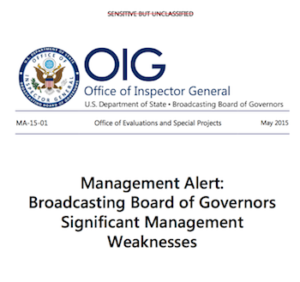 During the same period, the Office of Inspector General (OIG) uncovered numerous other violations of government rules and regulations and waste of taxpayers’ money by the agency’s management. BBG Chairman Jeff Shell later said that many of these violations have already been dealt with and resolved. He took issue with OIG’s “ineffective leadership” assessment of the BBG.
During the same period, the Office of Inspector General (OIG) uncovered numerous other violations of government rules and regulations and waste of taxpayers’ money by the agency’s management. BBG Chairman Jeff Shell later said that many of these violations have already been dealt with and resolved. He took issue with OIG’s “ineffective leadership” assessment of the BBG.
In November 2014, Washington Post columnist Joe Davidson reported that the BBG’s International Broadcasting Bureau Chief of Staff Marie Lennon proposed in a memo to the BBG board that the agency use staffing firms as a solution to longterm violations of Federal contracting regulations.
In a Dec. 9, 2013 memo to members of the board, Marie Lennon, Chief of Staff at the International Broadcasting Bureau, the BBG’s administrative arm, said that using staffing agencies “would likely cost the Agency at least an additional 30 percent on average for each contractor due to overhead costs for the firm itself.”
READ: Agency few Americans use generates controversy, this time with contractors, Joe Davidson, The Washington Post, November 24, 2014.
Davidson reported that “more than 150 contractors sent a letter to BBG chairman Jeffrey Shell, with copies to 31 members of Congress, urging additional funding” for broadcasting and online reporting to strategically key countries, such as Russia, Iran, and China. According to one source, some full-time federal Voice of America employees also signed the letter to show solidarity with their colleagues who do the same broadcasting and journalistic jobs at much less pay and no benefits or employment protections.
“Instead, the agency seems to be attempting to sweep the issue under the rug by bringing in a third party middle man to be a buffer between employer and employee, and avoiding any redress for the apparent past wrongdoing.” From a letter of Broadcasting Board of Governors (BBG) Voice of America (VOA) and Office of Cuba Broadcasting (OCB – Radio and TV Marti) media content-producing contract employees to BBG Chairman Jeff Shell and members of the U.S. Congress.
The Washington Post article provided links to U.S. Government’s Office of Inspector General document and to internal BBG memos to illustrate the story, as well as links to BBG Watch.
Just last week it [BBG] began compensating people who were improperly fired in 2009 from the anachronistic Office of Cuba Broadcasting. Its [Voice of America’s] election night coverage three weeks ago was the target of derisive comments on BBG Watch , an online publication by current and former employees. Year after year, including this one, the BBG is a loser on key employee survey questions.
BBG Briefing Paper on Use of Contractors
In January 2014, one of BBG Watch volunteer-reporters contacted former Broadcasting Board of Governors member Victor Ashe by phone at his home at Knoxville, TN to get his perspective on the then developing scandal over violations of IRS tax rules by agency officials where he was a board member until late 2013. Ashe is a former U.S. Ambassador to Poland and former popular long-term mayor of Knoxville. He had served many U.S. administrations of both parties in various federal positions.
This is how BBG Watch reporter summarized for BBG Watch the phone conversation with Ashe in January 2014:
“After years of neglect from prior management, Broadcasting Board of Governors is now moving to remedy the mistreatment from a pay standpoint for 35% of BBG’s employees who are on contract as opposed to being fulltime federal employees,” former BBG member Victor Ashe said.
“Of course this is due to the heavy pressure from the Internal Revenue Service and the Office of Inspector General,” Ashe added.
“One reason BBG has ranked so poorly in Office of Personnel Management (OPM) morale surveys is the way contract employees are treated, as well as the fallout from the Office of Cuba Broadcasting (OCB) Radio and TV Marti lawsuit from former Cuban American employees in Miami who were illegally dismissed, according to findings by an impartial Federal Arbitrator and legal panels. This lawsuit, which management has lost at every step along the way, continues with costs exceeding $3.5 million. While it may last two more years, cost may exceed $5.3 million by the time it is over. No one seems bothered by this use of tax dollars,” Ashe added.
“Morale at the three entities, which are Radio Free Asia (RFA), Radio Free Europe / Radio Liberty (RFE/RL) and Middle East Broadcasting Networks (MBN), remains much higher,” he added.
“International Broadcasting Bureau (IBB) has a terrible history of mistreating contract employees,” Ashe said.
“Congress needs to act swiftly to correct these problems and monitor carefully how BBG is handling the IRS audit and OIG findings. BBG owes the public an explanation on why this has occurred and how they plan on finding $12 to $18 million,” he added.
“This is all about righting a wrong. IBB past management thought they could get away with this violation of federal practices and law. Now this seems to be at an end.”
“Now the BBG board should review the Radio and TV Marti lawsuit by Cuban Americans laid off wrongly over 4 years ago and attempt to settle it. Otherwise, BBG may face $5 million in legal expenses,” Ashe added.
“I commend Jeff Shell, the new chair, for his efforts to correct the problems he inherited,” Victor Ashe stated.
IBB officials had accused Ambassador Ashe of being too aggressive in asking questions about unauthorized spending, exposing other abuses and condemning poor employee morale and mistreatment of contractors at the agency. Some OIG inspectors initially sided with BBG officials against Ashe, but a different team of OIG inspectors eventually found unauthorized practices Ashe kept warning about while he was still a BBG board member and tried to get them corrected but reportedly could not get enough support from other BBG members.
Only the OCB case was resolved and a few of the minor problems have been corrected since this interview with Victor Ashe in 2014. While a few IBB officials left the agency, some of the key officials blamed for mismanagement at BBG, IBB, VOA, and RFE/RL are still occupying key executive positions. Employee morale remains low. In 2015, BBG was again ranked next to last in employee satisfaction among mid-size federal agencies in the Federal Employee Viewpoint Survey conducted by the Office of Personnel Management (OPM). BBG contract employees do not participate in these surveys. If they did, the results would no doubt be even worse.
H.R. 2323, the United States International Communications Reform Act, to improve the missions, objectives, and effectiveness of U.S. international broadcasters, introduced on May 14, 2015 by House Foreign Affairs Committee Chairman Rep. Ed Royce (R-CA) and Ranking Democrat Rep. Eliot Engel (D-NY) includes the following Findings:
(7) Both the Department of State’s Office of Inspector General and the Government Accountability Office have issued reports which outline a severely dysfunctional organizational structure of the Broadcasting Board of Governors.
(8) The Inspector General of the Department of State concluded in its January 2013 report that dysfunction of the BBG stems from ‘a flawed legislative structure and acute internal dissension’.
(9) The Inspector General of the Department of State also found that the BBG’s structure of nine part-time members ‘cannot effectively supervise all United States Government-supported, civilian international broadcasting’, and its involvement in day-to-day operations has impeded normal management functions.
(11) According to the Office of the Inspector General, the BBG’s Office of Contracts is not in compliance with the Federal Acquisition Regulation, lacks appropriate contract oversight, and violates the Anti-Deficiency Act. The Office of the Inspector General also determined that the Broadcasting Board of Governors has not adequately performed full and open competitions or price determinations, has entered into hundreds of personal service contracts without statutory authority, and contractors regularly work without valid contracts in place.
In 2013, Secretary of State Hillary Clinton, who was herself an ex officio BBG member, described the BBG as “practically defunct.”
BBG CEO John Lansing and BBG Chairman Jeff Shell are on the record opposing the key provision of the bipartisan H.R. 2323 bill which calls for two boards and two CEOs to improve oversight and accountability of both federal and non-federal media entities currently overseen by the part-time BBG board. They claim that improvements have been made and management problems are being solved. John Lansing said that he is working on his own plan to reform the agency.
Matthew Armstrong, a current Republican BBG board member, called the bill’s criticism of the BBG “dated,” “overly harsh,” “not fair” and its language “less than inarticulate“[sic]. In contrast, recent former BBG members, Dennis Mulhaupt and S. Enders Wimbush, said that the bipartisan bill H.R. 4490 (an earlier version of H.R. 2323) represents “serious reform that actually addresses U.S. international broadcasting’s many challenges.”
Ambassador Victor Ashe is also a strong supporter of management reforms proposed in H.R. 2323.
The class action lawsuit and poor treatment of Radio Free Europe / Radio Liberty (RFE/RL) thrird-country contract employees are generating bad publicity for the Broadcasting Board of Governors and the United States abroad. RT USA, the English language website of Russia’s overseas propaganda media outlet RT, posted a report on the $400 million class action lawsuit.
Two former RFE/RL employees, Armenian citizen Anna Karapetian and Croatian citizen Snjezana Pelivan, have filed a complaint with the United Nations Human Rights Council (UN HRC) in Geneva against both RFE/RL and BBG. They allege discrimination at RFE/RL in Prague, Czech Republic, based on national origin.
Disclaimer: BBG Watch is not engaged in rendering legal service or advice. If such advice or other expert assistance is required, the services of a competent professional person should be sought. While we make every effort to include accurate, up-to-date, and objective information and analysis, the nature of news reporting, news and policy analysis, and work done under the pressures of deadlines carry with them risks of errors, omissions, and subjective judgments. We do not guarantee that all information on this Site is accurate, complete, and up-to-date.

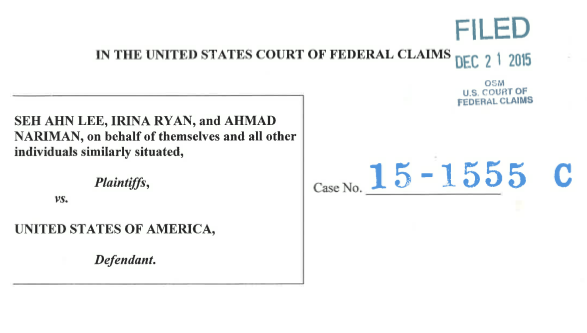
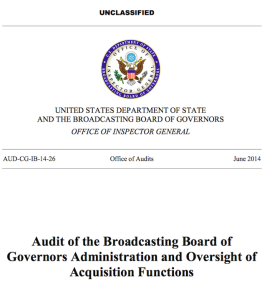
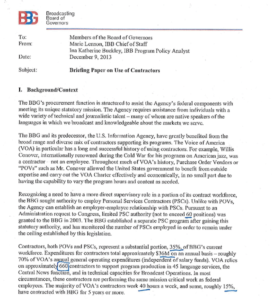
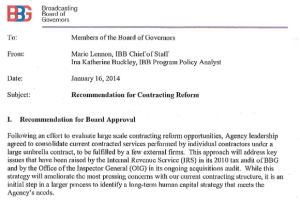
Comments are closed.